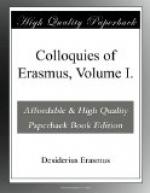Fa. So I have heard.
Eu. They grow slack or tight by the Moisture and Driness of the circumambient Air, and will sometimes break.
Fa. I have seen that more than once.
Eu. On this Account you may do uncommon Service to your little Infant, that his Mind may have an Instrument well tempered, and not vitiated, nor relaxed by Sloth, nor squeaking with Wrath, nor hoarse with intemperate drinking. For Education and Diet oftentimes impress us with these Affections.
Fa. I’ll take your Counsel; but I want to hear how you can defend Aristotle.
Eu. He indeed in general describes the Soul, Animal, Vegetative, and Sensitive. The Soul gives Life, but every Thing that has Life is not an Animal. For Trees live, grow old, and die; but they have no Sense; tho’ some attribute to them a stupid Sort of Sense. In Things that adhere one to another, there is no Sense to be perceived, but it is found in a Sponge by those that pull it off. Hewers discover a Sense in Timber-Trees, if we may believe them: For they say, that if you strike the Trunk of a Tree that you design to hew down, with the Palm of your Hand, as Wood-Mongers use to do, it will be harder to cut that Tree down because it has contracted itself with Fear. But that which has Life and Feeling is an Animal. But nothing hinders that which does not feel, from being a Vegetable, as Mushrooms, Beets, and Coleworts.
Fa. If they have a Sort of Life, a Sort of Sense, and Motion in their growing, what hinders but that they may be honoured with the Title of Animals?
Eu. Why the Antients did not think fit to call them so, and we must not deviate from their Ordinances, nor does it signify much as to what we are upon.
Fa. But I can’t bear the Thoughts on’t, that the Soul of a Beetle and of a Man should be the same.
Eu. Good Madam, it is not the same, saving in some Respects; your Soul animates, vegetates, and renders your Body sensible; the Soul of the Beetle animates his Body: For that some Things act one Way, and some another, that the Soul of a Man acts differently from the Soul of a Beetle, partly proceeds from the Matter; a Beetle neither sings nor speaks, because it wants Organs fit for these Actions.
Fa. Why then you say, that if the Soul of a Beetle should pass into the Body of a Man, it would act as the human Soul does.
Eu. Nay, I say not, if it were an angelical Soul: And there is no Difference between an Angel and a human Soul, but that the Soul of a Man was formed to act a human Body compos’d of natural Organs; and as the Soul of a Beetle will move nothing but the Body of a Beetle, an Angel was not made to animate a Body, but to be capable to understand without bodily Organs.
Fa. Can the Soul do the same Thing?
Eu. It can indeed, when it is separated from the Body.




